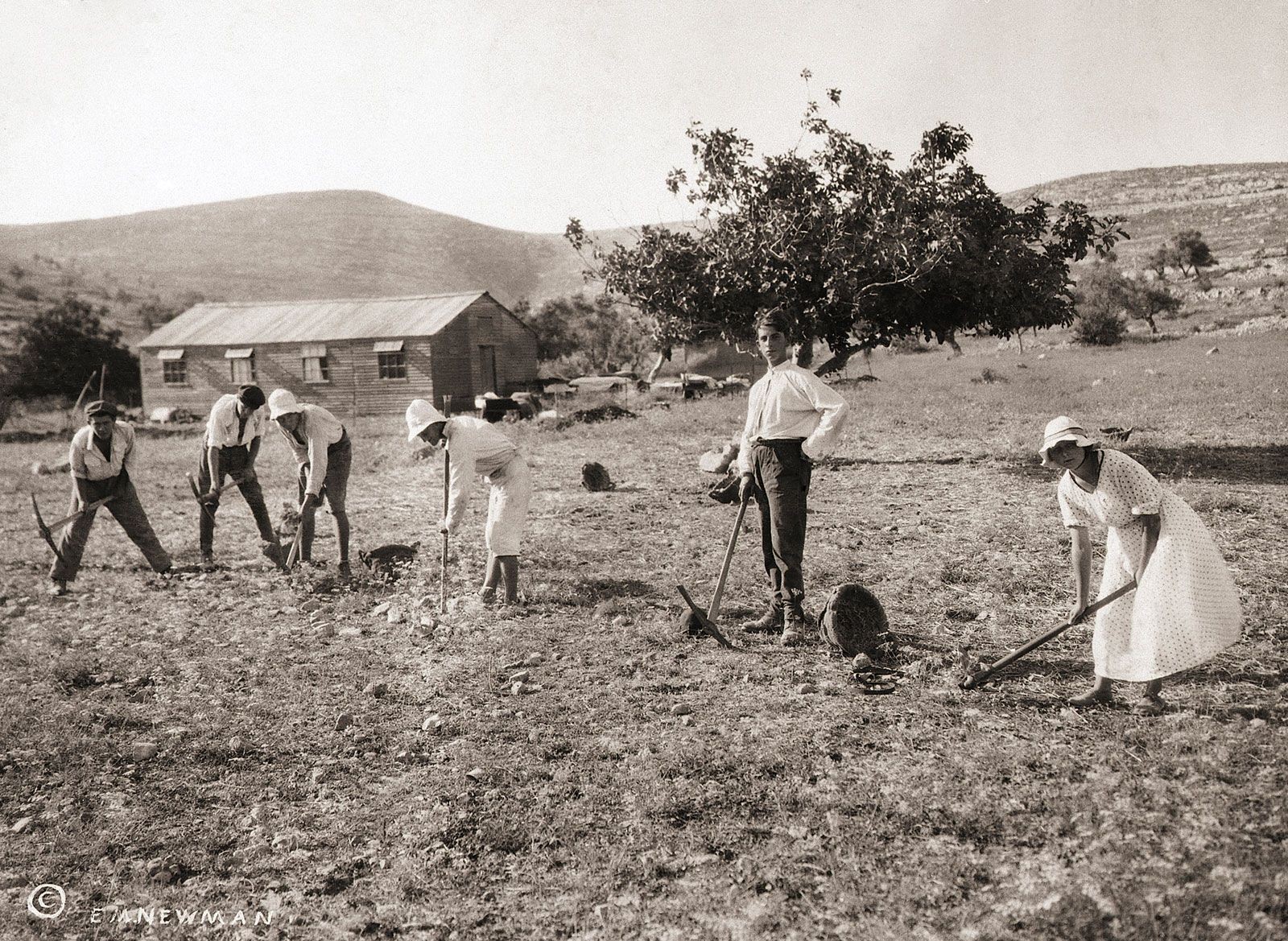Zionism is a term frequently encountered in discussions about Israel and the Middle East. But What Is A Zionist Simple Definition? At its heart, Zionism is a nationalist movement rooted in the idea of self-determination for Jewish people. It advocates for the establishment and support of a Jewish nation-state in the historical Land of Israel, also known as Palestine.
Early 20th-century Zionist pioneers reclaiming and cultivating land in Palestine, illustrating the practical efforts to build a Jewish homeland.
While the core concept is straightforward, the history and implications of Zionism are complex and multifaceted. To truly grasp what a Zionist is, it’s crucial to delve into its origins, evolution, and the varying perspectives surrounding it.
Defining Zionism in Simple Terms
In simple terms, a Zionist is someone who supports the idea of a Jewish homeland in the region historically known as Palestine. This support stems from a variety of factors, including:
- Historical Connection: A deep-rooted connection to the Land of Israel as the ancestral homeland of the Jewish people and the birthplace of Judaism.
- Religious Significance: The importance of Jerusalem and Zion in Jewish religious tradition and scripture.
- National Identity: The belief that Jewish people, like other nations, have the right to self-determination and a sovereign state.
- Refuge and Security: Historically, Zionism emerged partly as a response to anti-Semitism and the need for a safe haven for Jews.
It’s important to recognize that Zionism is not monolithic. There’s a spectrum of Zionist beliefs and ideologies. Some key aspects to understand are:
- Political Zionism: Focused on practical political action and diplomacy to achieve a Jewish state, primarily associated with Theodor Herzl.
- Labor Zionism: Emphasized building a socialist Jewish society in Palestine through collective settlements and labor.
- Religious Zionism: Integrates religious beliefs into Zionism, often seeing the establishment of Israel as part of a divine plan.
- Revisionist Zionism: Advocated for a more assertive and sometimes militaristic approach to achieving Zionist goals.
The Historical Roots of Zionism
While modern Zionism is considered a late 19th-century movement, its roots are much older, intertwined with Jewish history and religious beliefs.
For centuries, Jewish people around the world have maintained a connection to the Land of Israel, praying for a return to Zion (Jerusalem) and remembering it in rituals and traditions. This longing was primarily religious and spiritual. However, various historical developments in the 19th century transformed this yearning into a political movement.
The Haskalah and Early Seeds of Modern Zionism
The late 18th-century Haskalah, or Jewish Enlightenment, encouraged Jews to integrate into European society and embrace secular culture. However, in Eastern Europe, assimilation proved difficult, and Jews faced persistent discrimination and violence, notably through pogroms in Tsarist Russia.
Amidst these challenges, the Ḥovevei Ẕiyyon (“Lovers of Zion”) movement arose, advocating for practical steps towards Jewish settlement in Palestine. Initially, this focused on agricultural settlements and supporting Jewish farmers and artisans.
Map depicting the British Mandate of Palestine (1917–47), a crucial geopolitical entity during the development of the Zionist movement and the eventual establishment of Israel.
Theodor Herzl and the Rise of Political Zionism
A pivotal figure in transforming Zionism into a global political movement was Theodor Herzl. An Austrian journalist, Herzl initially believed assimilation was the best path for Jews. However, witnessing the Dreyfus Affair in France and the pervasive anti-Semitism in Europe convinced him that Jews would never be fully accepted in European societies.
Herzl argued that the solution was the creation of a Jewish state. In 1897, he convened the First Zionist Congress in Basel, Switzerland. This congress formulated the Basel Program, which declared that “Zionism strives to create for the Jewish people a home in Palestine secured by public law.” This marked the formal beginning of organized political Zionism.
Theodor Herzl, considered the father of modern Zionism, whose political activism and vision galvanized the Zionist movement in the late 19th century.
Herzl established the Zionist Organization (later the World Zionist Organization) and tirelessly worked to gain international support for the Zionist project. He sought the backing of major powers like the Ottoman Empire (which then ruled Palestine) and Great Britain.
Theodor Herzl’s historic visit to Palestine around 1898, symbolizing the Zionist movement’s focus on establishing a physical presence in the ancestral homeland.
The Path to a Jewish State
Despite facing resistance from the Ottoman authorities, the Zionist movement gained momentum, particularly in Eastern Europe where Jewish communities faced persecution. Waves of Jewish immigrants, known as Aliyah, began arriving in Palestine in the late 19th and early 20th centuries.
World War I and the Balfour Declaration
World War I proved to be a turning point. Zionist leaders, particularly Chaim Weizmann, successfully lobbied the British government. In 1917, the British government issued the Balfour Declaration, a public statement expressing support for “the establishment in Palestine of a national home for the Jewish people.”
This declaration, though vaguely worded, was a major diplomatic achievement for the Zionist movement. After World War I, the League of Nations granted Britain a mandate over Palestine, incorporating the Balfour Declaration into the mandate terms.
Chaim Weizmann, a prominent Zionist leader and later the first President of Israel, played a crucial role in securing the Balfour Declaration and fostering international support for Zionism.
Building a Jewish Community in Palestine
During the British Mandate period (1920-1948), Zionist organizations worked to build a Jewish community in Palestine. This included:
- Immigration and Settlement: Encouraging and facilitating Jewish immigration.
- Economic Development: Establishing agricultural settlements (kibbutzim, moshavim) and urban centers.
- Cultural Institutions: Founding the Hebrew University of Jerusalem and promoting Hebrew language and culture.
- Self-Defense Organizations: Forming groups like the Haganah to protect Jewish communities amidst growing Arab-Jewish tensions.
A kibbutz in the late 1930s, showcasing the communal agricultural settlements that were central to the Zionist project of building a Jewish society in Palestine.
The Establishment of Israel and its Aftermath
The rise of Nazism and the Holocaust dramatically increased the urgency of establishing a Jewish state as a refuge. After World War II, and facing increasing violence and the inability to reconcile competing Arab and Jewish claims, Britain turned the Palestine issue over to the United Nations.
In 1947, the UN General Assembly passed Resolution 181, recommending the partition of Palestine into separate Jewish and Arab states. While the Zionist leadership accepted the plan, Arab leaders rejected it.
On May 14, 1948, David Ben-Gurion declared the independence of the State of Israel. This declaration was immediately followed by the 1948 Arab-Israeli War. Israel emerged victorious but at the cost of displacement and conflict that continues to this day.
Zionism After the Founding of Israel
With the establishment of Israel, Zionism achieved its primary goal of creating a Jewish state. However, Zionism did not cease to exist. Instead, its focus shifted to:
- State-Building: Strengthening the State of Israel, developing its economy, and integrating Jewish immigrants from around the world.
- Security and Defense: Protecting Israel from external threats and internal conflicts.
- Peace and Diplomacy: Seeking peaceful coexistence with neighboring Arab states and resolving the Israeli-Palestinian conflict.
- Maintaining Jewish Identity: Promoting Jewish culture, heritage, and connection to Israel among Jews worldwide.
Israel has achieved peace treaties with Egypt, Jordan, the UAE, Bahrain, and Morocco. However, the conflict with Palestinians remains unresolved, and tensions persist with some neighboring countries and groups like Hamas and Hezbollah.
Anti-Zionism: Opposition to the Movement
From its inception, Zionism has faced opposition. Understanding what is a Zionist simple definition also requires acknowledging the existence and nature of anti-Zionism.
Opposition to Zionism comes from diverse sources and motivations:
- Religious Objections: Some religious Jews historically opposed Zionism, believing that a Jewish state could only be established by divine intervention with the coming of the Messiah. Groups like Neturei Karta still hold this view.
- Secular Objections: Some secular Jews feared Zionism would hinder their integration into non-Jewish societies and create dual loyalties.
- Palestinian Perspective: Palestinians oppose Zionism as they view it as a movement that led to their displacement and dispossession, denying them their right to self-determination in Palestine.
- General Anti-Nationalism: Some critics oppose all forms of nationalism, including Zionism, as inherently discriminatory and exclusionary.
- Anti-Semitic Conflation: Tragically, anti-Zionism sometimes becomes a guise for or overlaps with anti-Semitism, using criticism of Israel or Zionism to express hatred or prejudice against Jews.
It’s crucial to distinguish between legitimate criticism of Israeli government policies and anti-Semitism. However, it’s also important to recognize that anti-Zionism, regardless of intent, can have the effect of denying the legitimacy of Jewish statehood and alienating many Jewish people who see Zionism as central to their identity and history.
Conclusion: Understanding Zionism Today
What is a Zionist simple definition? A Zionist is someone who believes in the right of Jewish people to self-determination and supports a Jewish state in the historical Land of Israel. While this definition is simple, the history and implications of Zionism are complex and continue to be debated.
Understanding Zionism requires acknowledging its historical context, the diversity of Zionist thought, its achievements in establishing the State of Israel, and the ongoing challenges and criticisms it faces. It is a movement that has profoundly shaped the 20th and 21st centuries and remains a vital factor in understanding the Middle East and Jewish identity today.

